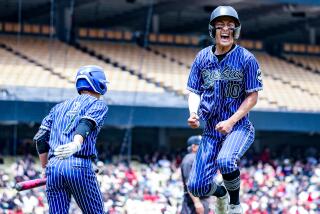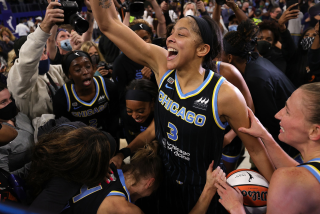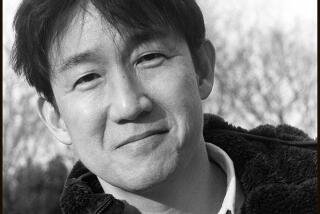A Skater Who Learned How to Break the Ice : Hockey: After overcoming initial obstacles in Canada, Richard Park has become a premiere amateur league player.
- Share via
It is autumn on the shores of Lake Ontario east of Toronto, the maple leaves are turning a reddish-brown and Richard Park of Rancho Palos Verdes is back in a chilly hockey rink.
Park, now 17, has been in Canada for nearly five years, seasoning his ice hockey skills in an attempt to make it to the National Hockey League. He was a young phenomenon in Southern California, once scoring 10 goals in a game against older opponents. Elite clubs on this side of the border sought his talents, but the budding star knew he had to prove himself on the ice of the Great White North.
When he was 12, the Korean-born center packed his bags, said goodby to surfing buddies at the Manhattan Beach Pier and moved with his 19-year-old sister, Christina, to hockey-obsessed Canada. Now 17, he’s been one of the standout players with the Belleville Bulls of the Ontario Hockey League, which has supplied more players to the National Hockey League than any other amateur league.
Park has the tools to follow in the footsteps of Wayne Gretzky or Eric Lindros, two NHL stars who also played in the Ontario league. At 6-foot, 185 pounds, Park can bang the boards, but until recently, it has been his speed and stick handling that have carried him.
“I’ll put him up against any skater in the NHL,” personal trainer Dan Cameron, who has worked with dozens of NHL players, said. “He’s got the skills, he’s got the mental and physical tools. He’s got everything.”
For the 1992-93 season, Park was one of only two 16-year-old players in a league that includes skaters that are as old as 21. Still, he was the Bull’s No. 1 draft pick. In 66 games he led the club with 23 goals and 38 assists.
“He has a lot of great skill,” Bulls Coach Larry Mavety said. “He’s a great skater, has a good shot and handles the puck well. He does everything you are supposed to do.”
A popular figure in hockey magazines and on Canadian television, Park’s story has been told in Korean, French and English-language publications. The Park house, in an exclusive enclave off Palos Verdes Drive East, is decorated with hundreds of trophies and newspaper accounts of Richard Park.
It was, nevertheless, a difficult decision for Paul and Jean Park to let the youngest of their four children venture so far away from home with their eldest daughter. Wealthy importers who came to the United States 11 years ago, the Parks wanted their son to concentrate on school. But Richard, introduced to ice skating by Christina when he was 8, became too engrossed in hockey. The elder Parks, meanwhile, struggled to understand customs in their newfound country, a culture that teaches children it’s all right to be different.
“I try to copy the American people,” Jean Park said at the time. “But school first, hockey second.”
Richard spent most of his time at the old Bay-Harbor Ice Rink in Harbor City, a slap shot away from his home, dreaming of a chance at the big leagues. In the summer of 1989, after leading the Los Angeles Junior Kings to the California Pee Wee Division title as a center/defenseman, he was invited to play for a Toronto youth team in an all-star tournament in Vancouver, British Columbia.
Richard didn’t get the ice time he thought he would.
“He was very upset,” Christina Park said. “He wanted to let people know that he was as good or better than those kids from Toronto who had played the game all their lives.”
The Park family was told by American hockey experts that the best place Richard could train was in Canada, and Richard pleaded. That fall, with Mom and Dad footing the bill, Richard Park packed his sticks and moved into a Toronto apartment with Christina.
It wasn’t easy for Jean Park to let go.
“She cried,” Christina said. “Richard was her baby. She didn’t want him, or her daughter, to go.”
Richard Park tried out for a team in the Metro Toronto Hockey League, the city’s premier association, and a first step made by many of today’s Canadian-born NHL stars. His performance lifted eyebrows, but Toronto parents didn’t like the idea of an American butting in, and they made an uproar. Under pressure, league officials deemed him an outsider and invoked an old rule that said every player had to be an “established” resident of the city. The same rule had been applied to Gretzky when he played in the Metro league, and even he was forced to move into town.
Undaunted, the outspoken Christina Park set out to meet the requirements set forth by the league. Richard was enrolled in a parochial school. Christina went to a Canadian court and was named Richard’s legal guardian. Mom and Dad bought them a condominium in Christina’s name and she withdrew from the premed program at Loma Linda University in Southern California and enrolled at the University of Toronto.
“We just went to Toronto so he could play hockey,” Christina Park said. “We didn’t know anything about the rules. We didn’t know that Richard was not going to be allowed to play.”
The Metro league eventually relented and Richard Park rapidly rose to become one of the finest young hockey players in Canada. By the time he was 16, Mavety said, he could have been a top draft pick in the NHL, had he not been too young.
“He’s a bright young man, he knows what it takes and he knows what his purpose for playing hockey is,” Cameron said. “To be a pro hockey player you’ve got to have a good head on your shoulders. He’s very businesslike in his approach and already conducts himself like a professional.”
But businesslike or not, the popular Canadian television show “The Fifth Estate” claimed that both Parks have “forfeited childhood for a crack at adult glory.”
And Mavety points out that “a lot of people forget that the kid only just turned 17.”
In Belleville, two hours east of Toronto, Richard has been a center of attention. Older players scowled at the publicity, but Park’s crisp play has made him a crowd-pleaser in the tiny hamlet, where Bulls’ skaters are like family to many of the 34,000 residents.
Has he ever been homesick for the beach, warm weather or Southern California?
“This has been like a long vacation,” Richard said. “I have to look where it’s going to take me. We’ll see in 1994 how good this was for me.”
Richard Park appears half Canadian now. He’s no longer the shy, retiring skater who tore up the ice at the old Bay Harbor. His diction is laced with hints of a Canadian accent and he has acquired disdain for the glitzy surroundings he once had.
“Kids mature more quickly in Canada,” Park said. “There’s a great big burden on their shoulders from the time they are young.
“In Los Angeles, everyone has a gardener to mow their lawn. If it snowed, they’d have people to shovel the snow. It’s a ritzy way of living. In Canada, even the rich work for things.”
Richard Park came to Canada to work. The payoff will come in June when the NHL conducts its annual draft. Park says he wants to play for the Anaheim Mighty Ducks. If that comes true, his odyssey will have come full circle, while he has changed forever.
More to Read
Go beyond the scoreboard
Get the latest on L.A.'s teams in the daily Sports Report newsletter.
You may occasionally receive promotional content from the Los Angeles Times.






